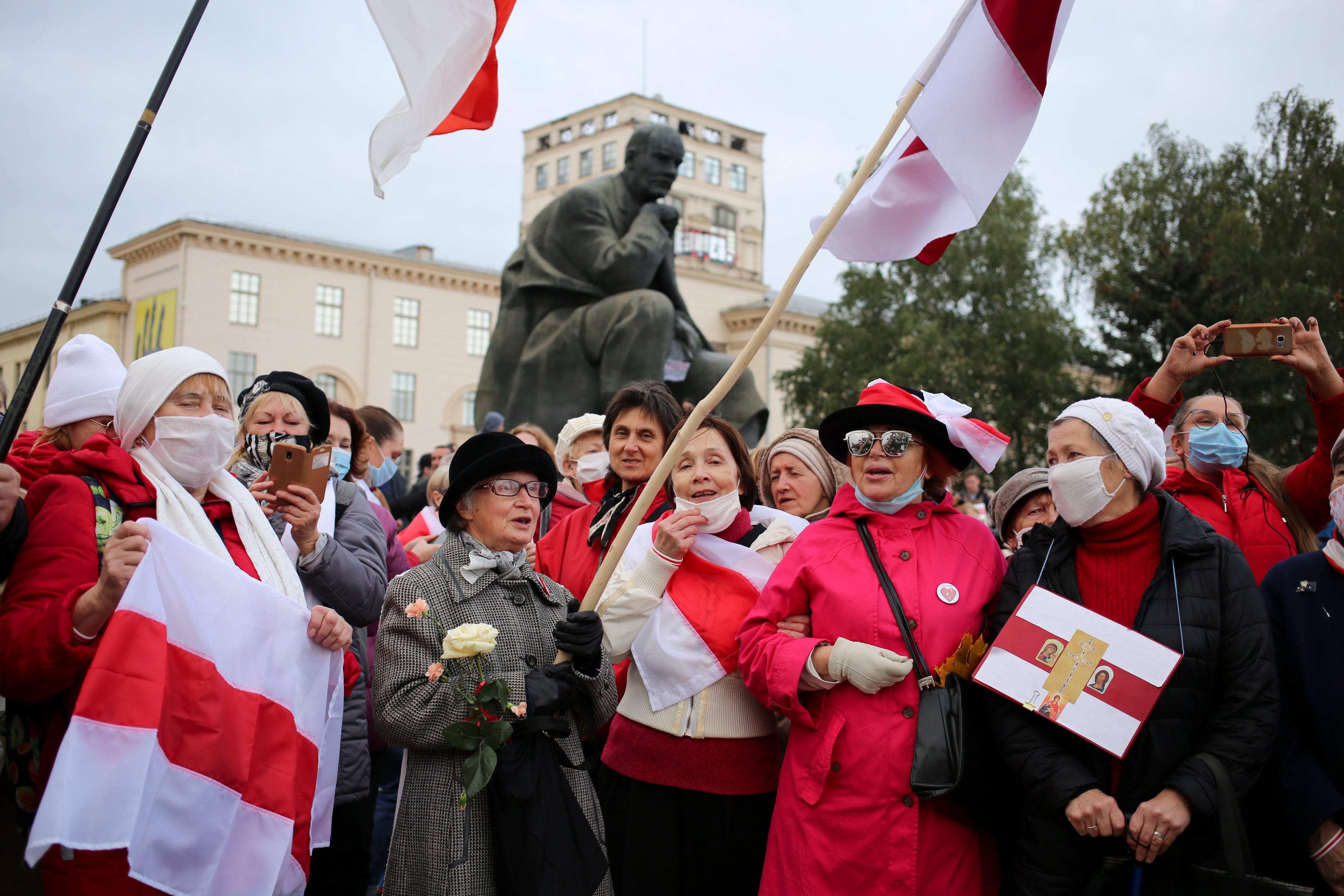Belarusian workers start national strike in final stand to unseat Lukashenko
Walkout was not total but opposition leader praises ‘lively’ way strikes began

Your support helps us to tell the story
From reproductive rights to climate change to Big Tech, The Independent is on the ground when the story is developing. Whether it's investigating the financials of Elon Musk's pro-Trump PAC or producing our latest documentary, 'The A Word', which shines a light on the American women fighting for reproductive rights, we know how important it is to parse out the facts from the messaging.
At such a critical moment in US history, we need reporters on the ground. Your donation allows us to keep sending journalists to speak to both sides of the story.
The Independent is trusted by Americans across the entire political spectrum. And unlike many other quality news outlets, we choose not to lock Americans out of our reporting and analysis with paywalls. We believe quality journalism should be available to everyone, paid for by those who can afford it.
Your support makes all the difference.The Belarusian opposition mounted its fiercest challenge to autocrat Alexander Lukashenko on Monday with the start of a rolling national strike aimed at forcing the embattled autocrat to the negotiating table.
The walkout was not total, and it was altogether limited in state enterprises most able to disrupt government balance sheets. Nonetheless, workers at several leading factories were seen to down tools, with production coming to a halt in a dozen workshops.
Scores of private enterprises, including in Minsk’s high-tech IT park, and the construction industry also participated more substantially. They were joined by schoolchildren and students, who protested throughout the day despite the risk of violent arrest.
The strike action came at the end of a midnight ultimatum set by protest leader Svetlana Tikhanovskaya, the widely assumed victor in the 9 August presidential elections that the 26-year ruler claimed his own. Now in exile in Lithuania, Ms Tikhanovskaya, 38, issued three demands: for Mr Lukashenko to resign; for an end to police violence; and for the release of political prisoners.
If it was a final warning, the autocrat gave no sign of heeding it. On Sunday, the final day of the ultimatum, he gave an order to disperse mass protests with uninhibited violence. His officers used plastic bullets and stun grenades against thousands of terrified demonstrators, leaving several with serious injuries.
In YouTube videos released on Monday, Ms Tikhanovskaya said the regime had shown violence was the “only thing it was capable of”. She claimed to be happy with the “lively” way strikes had begun. The joint action of “doctors, IT specialists, schoolkids, and private businesses, small and medium enterprises … demonstrated an incredible level of solidarity”, she said.
The mention of “solidarity” appeared not to be accidental. The Belarusian opposition has as its inspiration the Polish protest movement that went by the same name. The great hope is that strikes will eventually attract a critical mass of blue-collar workers at state enterprises and force Mr Lukashenko to talk — much like Polish Communist authorities eventually did in 1980.
Today’s efforts fall some way short of achieving a critical number. When all was said and done, Mr Lukashenko’s men were well prepared for the showdown, employing physical and financial threats in advance, and arresting those who took part in the strike actions on the day. According to the Viasna human rights centre, there were 228 arrests by 7pm local time (4pm GMT).
But the opposition may also look back on its big gamble with some relief, suggests Ryhor Astapenia, a research fellow at Chatham House, a London-based think tank. The declaration of a national strike has given flagging protests a “new impulse,” he says: “They also have a psychological and an organisational cost. Lukashenko understands if he doesn’t stamp out all these little fires now, one day the forest will burn everything down. That is going to wear him down.”
The Belarusian leader appears to be taking the possibility of a financial crisis seriously. Already foreign currency reserves are over 20 per cent down from August, says Nigel Gould-Davies, UK Ambassador to Belarus over 2008-09. “If Belarus’s ability to finance imports or pay law enforcement officers was compromised severe crisis could happen sooner rather than later.”
But the strike carries clear risks for the opposition too, the diplomat added. What was previously hitherto a weekend protest tradition now requires commitment every day. “It requires people to risk their health and safety, which is bad enough, but it also puts their livelihoods and their families in the balance.”
It was far from clear that Monday’s limited strike action would be enough to encourage many more to join.
Predicting the standoff to continue “for several months”, Mr Astapenia said even small strike numbers would ratchet the pressure up on Mr Lukashenko. Already, the manageability of the government machine was under question, he said. Without popular legitimacy, things just weren’t getting done outside law enforcement agencies.
“He has nowhere to go, no moves to play, no allies in the west, and impossible expectations from Russia,” the expert said.
“Every time he sends out the troops, you can see that he just wants to turn the clock back to how things were. But he’s slowly realising he can’t do it.”



Join our commenting forum
Join thought-provoking conversations, follow other Independent readers and see their replies
Comments